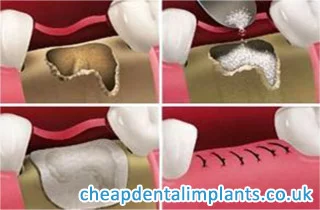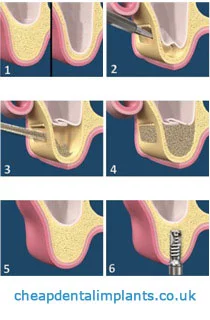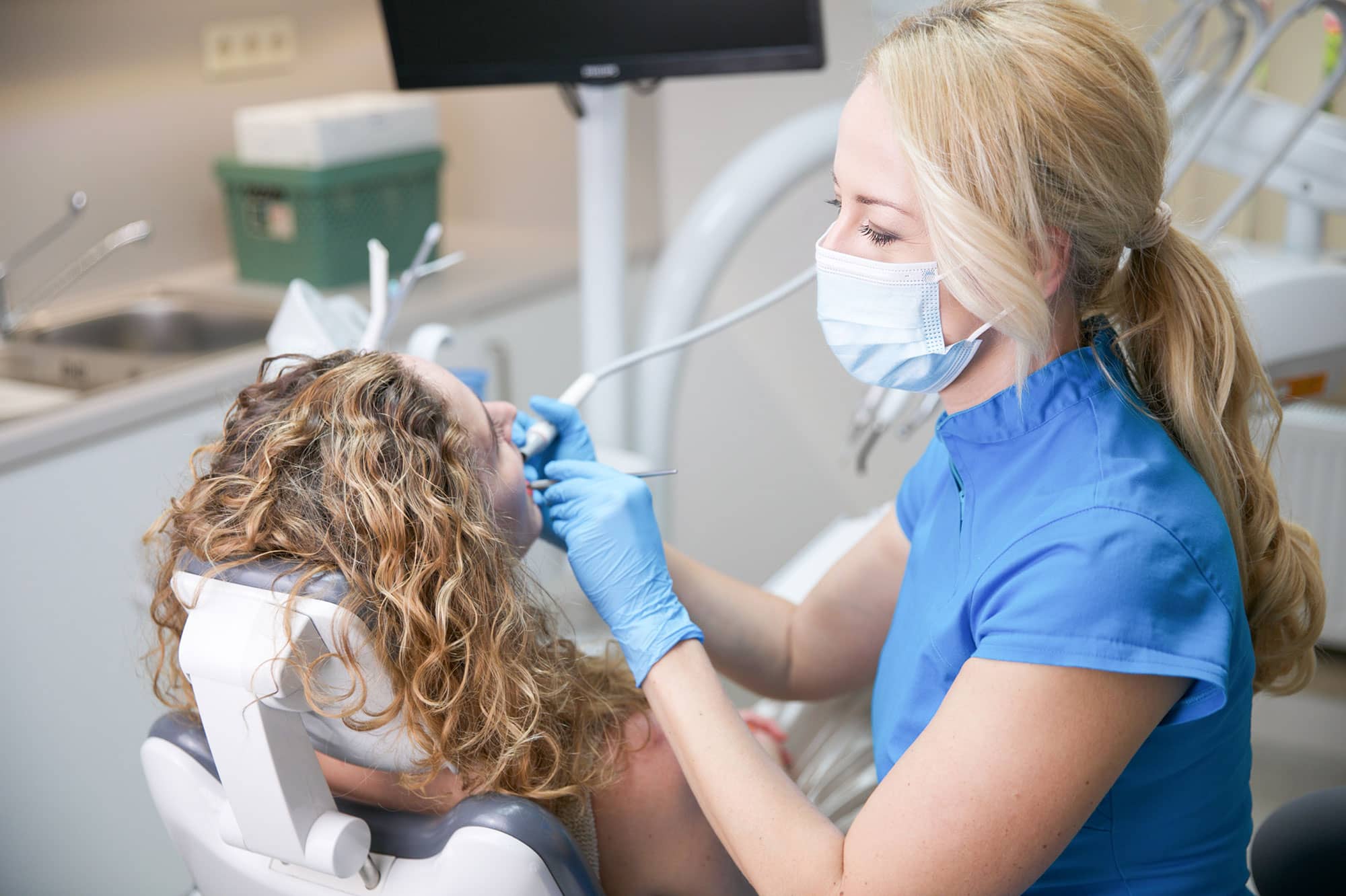Dental bone loss is one of the most frightening health concerns in dentistry. Not only because the loss of a tooth puts the dentures and the rest of the bone structure at risk. Losing our teeth also affects our quality of life. The bite force weakens and eating can become painful. Gum recession is usually associated with tooth loss, and it also causes aesthetic problems. Our smile can change, and in more severe cases, even our entire facial expression. The good news is, however, that we can do something about it. We have a number of tools at our disposal to prevent and reverse this process.

In this article you will find answers to the following:
- Causes of dental bone loss
- The course of dental bone loss.
- Dental bone loss preventation: with medical help
- How to prevent dental bone loss: What can the patient do?
- The role of vitamins and healthy eating in bone health
Causes of dental bone loss
The two main reasons behind dental bone loss are: tooth loss and a disease called periodontitis. Both are discussed in detail below.
Dental bone loss is caused by tooth loss.
Tooth loss can occur due to accidents and tooth decay caused by diseases. The tooth may loosen, weaken and fall out, or it may be removed as a medical intervention (tooth extraction). Whether we lose a tooth as a result of medical intervention or lose a decayed and loose tooth, or it is due to an accident, it will have an impact on the environment of the lost tooth.
Periodontitis
Periodontitis, or periodontal disease, is a bacterial infection of the tissues and bones that surround and hold teeth. This condition is the second, more severe stage of the gum problem. The condition that precedes periodontitis is a disease called gingivitis. Gingivitis is caused by plaque-forming bacteria that build up around the gum line. It causes a serious problem where the gum meets the tooth. Since the build-up occurs in the area where the gums are in contact with the teeth, this disease also damages the bones and tissues that hold the teeth. In addition, untreated gingivitis can lead to periodontal disease.
As a result of the tissue damage, the gums can pull away from the teeth, and even more, plaque can accumulate on these small surfaces (called pockets). As the condition worsens, the bone also begins to deteriorate. Thus, pre-existing periodontitis can result in the loosening of teeth. Loose teeth fall out on their own or have to be extracted.
Others.

In severe cases, the following diseases and conditions can also result in tooth loss.
- dental infection,
- failed root canal treatment,
- osteroporosis,
- misaligned dentures,
- dentures, without artificial roots,
- diabetes,
- smoking,
- poor oral hygiene,
- old age, etc.
The course of dental bone loss.
The regular movement of healthy teeth, i.e. chewing and biting, encourages the healthy jawbone to continuously grow and rebuild the bones. The bone of jaw needs constant stimulation to maintain its shape and density. However, the loss of a tooth also affects the chewing ability of the other teeth. Stimulation ceases around the place of the lost tooth, thus the other tooth is burdened with more work. As a result of this imbalance, bone atrophy may begin around the missing tooth. Long-term, large-scale tooth loss can lead to facial collapse. The remaining, still intact teeth may migrate, and part of the jawbone may collapse. This can also significantly deform the structure of the face. It is especially important to pay attention to the upper teeth, where the process of tooth loss can be even faster.
Dental bone loss preventation: with medical help
You can read about the treatment options used to reverse dental bone loss in the dental bone loss reversal article. Therefore, we are only touching the subject here.
Dental screening.
The chance to recover from diseases that precede dental bone loss depends on individual qualities, the patient’s attitude, and at which stage the treatment is started. Early symptoms of a gum problem include bleeding during brushing or flossing, bad breath, and red, swollen gums. If you experience these symptoms, visit your dentist. The first stage, gingivitis, is completely treatable. However, when periodontitis begins, we can only stop the process and make it asymptomatic, but often it already requires medical treatments. If the bones have already started deteriorating, the situation is even more difficult. In this case, there is no possibility to restore the original state.
Other medical screenings.
In addition to bacteria, other diseases also play a role in the development of periodontitis, or they can even accelerate the process. Medical research has shown that diabetes, osteoporosis, and smoking, among others, can lead to periodontal disease. Therefore, it is extremely important to recognize these diseases, to constantly monitor blood sugar levels and bone density, to go to check-ups, and, of course, to quit smoking. If you suffer from any of these diseases, pay very close attention to these tips to prevent dental bone loss. Also, read carefully our lifestyle tips as well.
In many cases, osteoporosis is caused by malnutrition, hormonal imbalance, or other illnesses, so the treatment requires complex testing.
How to prevent dental bone loss: What can the patient do?
With a healthy lifestyle and diet, we can do a lot to maintain the health of our teeth and the strength of our bones. These factors are discussed in detail below.
Chewing.
As we have already mentioned, healthy teeth need constant stimulation to keep the bones healthy. In order to maintain a healthy bone density, it is important for the jawbone that supports the teeth to be subjected to pressure due to chewing. Avoid diets where you don’t have to chew that much. Try to put pressure on all of your teeth evenly. Don’t only chew on one side or the other, and don’t use always the same teeth.
Dental care, oral hygiene.
Proper dental care is essential in maintaining the health of our teeth and avoiding these diseases. Brush your teeth at least twice a day. Use toothpaste that contains fluoride once a day. Fluoride strengthens the tooth enamel and forms a layer on the tooth that protects it from acidification caused by bacteria. Fluoride toothpaste should not be used by children under 10. Floss before brushing your teeth for thorough cleaning. However, be careful with mouthwash after brushing your teeth because you can easily remove this protective layer that toothpaste forms on your teeth. Using disinfectant mouthwash several times a day is not recommended because it can also kill good bacteria. If your dentist warns you about a gum problem, they might recommend the Corsodyl 0.2% intensive mouthwash solution, which has been clinically proven to treat gingivitis.
Smoking.
Smoking is a risk factor for many diseases. Giving up smoking is also an important step forward in the prevention of dental bone loss. The poor oral hygiene that usually accompanies smoking, the risk of infections, and tooth decay all affect the health of our teeth. Smoking also slows the healing process. You can read more about this in the dental bone graft and smoking article.
The role of vitamins and healthy eating in bone health
A healthy, balanced diet affects our entire body, including our teeth and bones. With the right vitamin intake and by avoiding harmful substances, we can improve the health of our teeth.
Healthy diet.

We probably don’t need to say too much about the effect of some basic food items. We hear a lot about the extremely harmful effects of sweets, sugar, and acidic substances on our teeth and tooth enamel. But in the same way, other food items can also have a detrimental effect on our teeth: for example, pieces of meat can get stuck in the gaps of our teeth. It is important to pay attention to proper dental care after consuming these kinds of foods. As a result of an improper or unbalanced diet, our bones can become more porous and lose their density. With proper dental care, these processes can be slowed down or stopped completely. However, you should also reduce the intake of harmful food items.
Vitamins, minerals.
Several vitamins and minerals play a role in the structure and health of our bones. These vitamins and minerals also prove to be extremely important in preventing the development of dental bone loss. These vitamins, minerals, and their effects are discussed in detail below.
Calcium.
One of the consequences of calcium deficiency is that our bones become more fragile. Naturally, calcium-rich foods are dairy products, kale, spinach, and sardines, among others.
Vitamin D.
Among other things, vitamin D is important for the proper development of the teeth and bones, and it also helps your bones to absorb calcium. Foods rich in vitamin D include egg yolk, and oily fish, but certain meats (liver, kidneys) also contain large amounts of vitamin D. In addition, sunshine enhances the production of vitamin D in the body. In winter, it is recommended to take supplements, but in summer the need for replacement is lower due to the increase in the number of sunny hours.
Vitamin C.
Vitamin C deficiency plays a role in the development of gingivitis and can also cause hemophilia, among other diseases. Peppers, spinach, broccoli, cabbages, fresh fruits, and citruses help prevent the development of vitamin C deficiency.
Magnesium, vitamin B12.
Research has shown that both magnesium and vitamin B12 deficiency have an effect on dental bone loss.
Others.
A balanced diet, rich in vitamins and minerals, supports our immune system and overall health. If the intake of these vitamins is not sufficient, it is recommended to replace them in another form, following the advice of a dietician or a specialist, e.g. in the form of supplements.
Probiotics.
Recent research has pointed out the connection between poor bowel health and the development of periodontal disease, among other things. It is therefore advisable to pay attention to the consumption of probiotics for the prevention of dental bone loss. In addition to supplements, the consumption of dairy products (yogurt, cheeses, kefir, etc.) containing probiotics in their natural form is recommended, but sauerkraut is also an excellent source of probiotics, especially in winter.
Read more about how to reverse bone loss in teeth or natural ways to build bone density. We can see that with a little care and, if necessary, a change in our lifestyle, we can do a great deal to maintain the health of our teeth. The key to preventing dental bone loss is right in front of us: a healthy lifestyle and proper oral hygiene are keys not only to maintaining our overall health but also to preventing this serious disease. If bone loss develops due to an illness or an accident, we may also need medical help, but we will discuss this in more detail in the next article.


